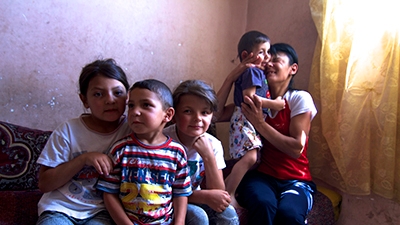
Lusine, a 28-year-old mother of four, lives with her family in a neglected dormitory on the outskirts of Gyumri village.
Both Lusine and her husband didn’t finish secondary education. When she got married a few years ago, her husband worked as a cattle herder and they could only afford to live a meager, rural life – something that has not changed even after the couple had four children. Now, Lusine wants to work so she can supplement the family’s income, but she doubts anyone would employ her.
“I only have eighth grade education, so I can’t earn enough money,” Lusine said. “I also don't have anyone to watch my children.”
Lusine is one of many people in Europe and Central Asia, whose daily life is a struggle.
As a region, ECA faces a unique problem in the form of long, harsh winters. This means families have to pay a lot more to stay warm and eat enough to survive such unrelenting conditions, compared to other, warmer parts of the world. On a daily basis, these costs add up, and $2.50 per person is often not enough. Consequently, many of these families live in poverty.
The World Bank interviewed several families in the region to document the issues that the poor face. While all of them said high heating bills, especially during the region’s long, cold winters were the biggest problem, they also believed that their children could escape poverty if they had good education, which would lead to good jobs.
To provide for the family, Lusine’s husband moved to a remote area of the Russian Federation, where he works as a daily laborer and sends home limited money sporadically. Lusine and their four children have no choice but to live in an abandoned building with no running water and a malfunctioning sewage system. During winters, the family uses plastic buckets as makeshift toilets. The walls are paper-thin and leaky. Lusine says she fears they will collapse in bad weather.
But she is prepared to endure such conditions because staying in the building allows her send her three oldest children to public school free of charge – something she is determined to keep doing because she considers it vital for their future.
Text books are free, but she still has to buy notebooks and pencils for the children.
Out of her family’s monthly income of 40,000 drams ($99), mostly through social benefits, she ends up spending 450 drams ($1.08) on just notebooks for each child. Her children each need at least two notebooks for each subject they study. Lusine does not compromise on education-related items, but that leads to a constant battle to pay for food for the five of them, heating costs and other daily expenses.
Lusine already owes 10,000 drams ($25) at the local bakery and 200,000 ($493) at the grocery store. Her biggest regret is that she did not go to college. Having the right education and skills is essential to finding a steady, well-paying job and having a better quality of life – something Lusine is hopeful that her children will have.
“I grew up in a boarding school,” Lusine said. “I always dreamed of a family and home of my own. All I want for my children is not to have the life I had. I want them to study and be able to sustain themselves.”


